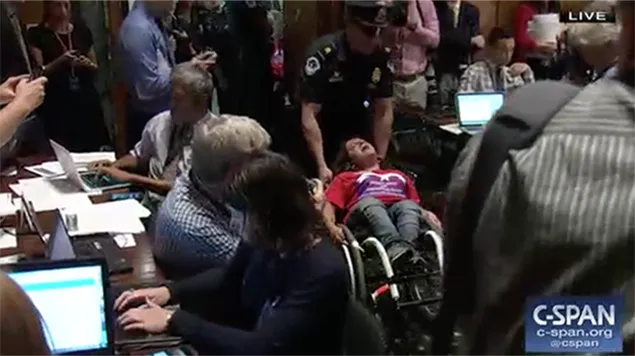
The Graham-Cassidy bill would likely result in 580,000 jobs lost, mostly in the healthcare sector, by 2027, according to an S&P Global Ratings report released Monday.
"Although the healthcare sector would likely see the most job losses, other sectors would feel the induced effect as the shock wave spread through the economy," S&P said.
In 2027, federal funding in block grants to states ends under Graham-Cassidy.
Beginning in 2020, the legislation would end Medicaid as an entitlement program, leaving states with capped funding per enrollee and vulnerable to an economic slump, S&P said. States that adopted Medicaid expansion would suffer the most.
[Also: Support for single payer climbs as medical groups denounce Graham-Cassidy bill]
Teresa Miller, acting secretary of the Department of Human Services in Pennsylvania said after seven years, states would be left holding the bag on a loss of $15 to $30 billion in federal funding over the next decade.
She and others urged instead to return to a bipartisan process such as legislation proposed earlier this month by Sens. Lamar Alexander and Patty Murray.
Former Deputy Administrator and director of the Center for Medicaid and CHIP Services Cindy Mann said Graham-Cassidy would take a step backward.
[Also: Republicans falling short on votes needed to pass Graham-Cassidy]
The analysis adds to the troubles of the Graham-Cassidy bill that remains short of the 50 Republican votes needed to pass by simple majority by a budget reconciliation deadline of September 30.
On Monday, Senate Finance Committee Chairman Orrin Hatch attempted to hold a hearing on the bill but was interrupted by shouts from the audience of "No cuts to Medicaid, save our liberty."
Police officers removed the protesters - some in wheelchairs and some by force - with Hatch recessing the hearing until order was restored.
The sponsors of Graham-Cassidy made revisions to the bill over the weekend. Senator Bill Cassidy, a physician, told the committee Monday that additional funding to states such as Maine and Alaska, where Senators Susan Collins and Lisa Murkowski, respectively, are expected holdouts on bill support, was done to account for rates of inflation and was done at the expense of non-expansion states.
Equity in funding occurs in 10 years, not six, he said.
Other Republican Senators who have said they will vote against the bill are Sens. Rand Paul and John McCain.
[Also: McCain to vote 'no' on Graham-Cassidy, Collins leaning 'no']
The bill is seen as a last-ditch effort on a GOP plan to repeal and replace the Affordable Care Act.
"No one has to buy a lemon just because it's the last car on the lot," said Committee Ranking Member Senator Ron Wyden.
Cassidy said the Affordable Care Act wasn't working when he knew residents of his state of Louisiana who were paying $6,000 deductibles and one had a premium of $39,000 a year.
Cassidy said the reports are the bill ends Medicaid expansion, but the reality is that states get money for flexibility for Medicaid.
America's Essential Hospitals added its voice to concerns over the legislation that has come from all corners of healthcare from providers and insurers.
The organization sent a letter to the bill's sponsors urging for reform that ensured individuals eligible for health coverage would continue to receive guaranteed access, essential health services, and other care.
The bill would "lead to unprecedented increases in uncompensated care at hospitals nationwide by simultaneously crippling hospitals' ability to provide care to uninsured individuals," said Bruce Siegel, president and CEO of America's Essential Hospitals.
Twitter: @SusanJMorse
Email the writer: susan.morse@himssmedia.com